Welcome to thoughtful, organic beauty
Hello Joyous is an organic, plant-based, sustainable beauty brand here to bring more joy to your day.
It’s likely no surprise that I love talking about natural skincare, body care, and other beauty products. The items that we use every day can be a source of amazing skin nourishment and support or they can be loaded with chemicals and ingredients that can increase our toxic load and have some not-so-beneficial effects not just on our skin, but on our whole body health.
If you’re struggling with chronic skin or detoxification issues, changing up your beauty routine is a great place to start since there are so many incredible natural alternatives that support holistic health. The first step to making a change to your beauty routine is learning about what ingredients you want to avoid, why you want to avoid them, and how to spot them.
Below, I’ll outline everything you need to know about the top 8 skincare ingredients to avoid, including what they are, how they're used, possible negative health impacts, and all-natural swaps that are kind to you and the planet so you can clean your beauty routine!
Top 8 Skincare Ingredients to Avoid
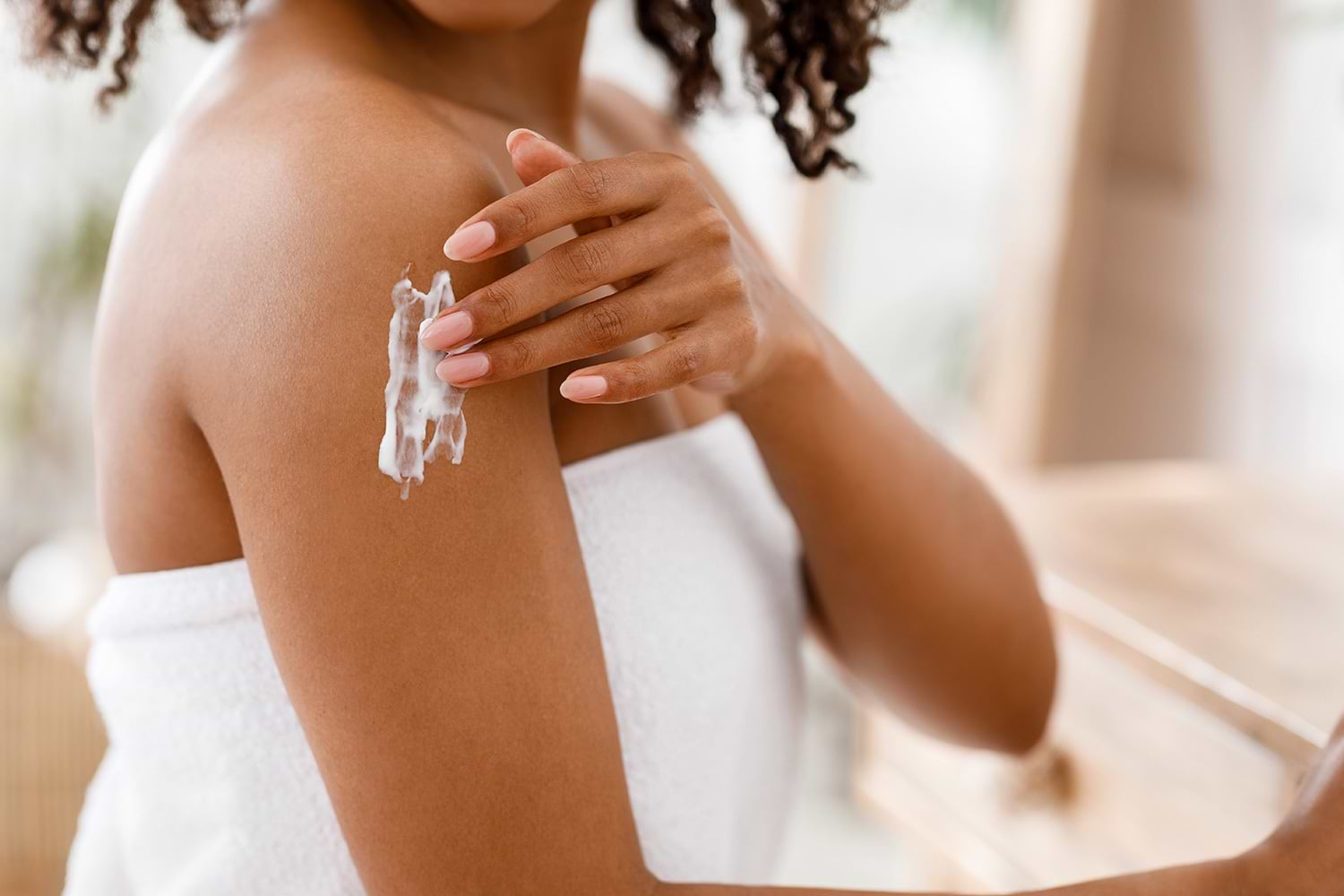
When it comes to these ingredients, one point that bears repeating is that The American Journal of Public Health found that the skin can absorb between 64% and 100% of the chemicals in your beauty products. The exact amount that is absorbed depends on several factors including whether you have any broken skin, the size of the molecule, or if your skin barrier function is compromised due to conditions such as acne, eczema, and rosacea.
A major issue with the beauty industry is that there is a huge lack in data and information on the health effects of ingredients such as BHT/BHA, formaldehyde-releasing preservatives, parabens, phthalates, petroleum-based ingredients, and synthetic fragrances. This lack of data is due to the industry being mostly unregulated so manufacturers and companies can choose to add chemicals to their products based on cost and availability, as opposed to the potential side effects or possible harm.
The EWG found that women use an average of 12 different products every day, which exposes them to about 168 chemical ingredients!
One of the major problems with these ingredients is that while they may not always be harmful in small, sporadic applications, there simply isn’t enough research to confirm the long-term effects of the daily use of personal care products that contain several of these chemicals. In fact, the Environmental Working Group found that women use on average 12 different products every single day. These products expose them to approximately 168 chemical ingredients. Men tend to use about 6 different products per day, exposing them to roughly 85 unique chemicals, not all of which have been tested for safety. And they definitely haven’t tested the compounding effect and safety of using that many chemicals every single day for years of your life.
The lack of information on the long term effects of these ingredients is why I’m so passionate about education. Feeling confident in your knowledge about these ingredients will allow you to make decisions to choose products that are the best for your health. Another important component to lower your toxic load is to support your body’s natural detoxification processes with healthy whole foods, dry skin brushing (learn how to do it here), and organic liver-supporting herbs.
1. Synthetic Fragrances
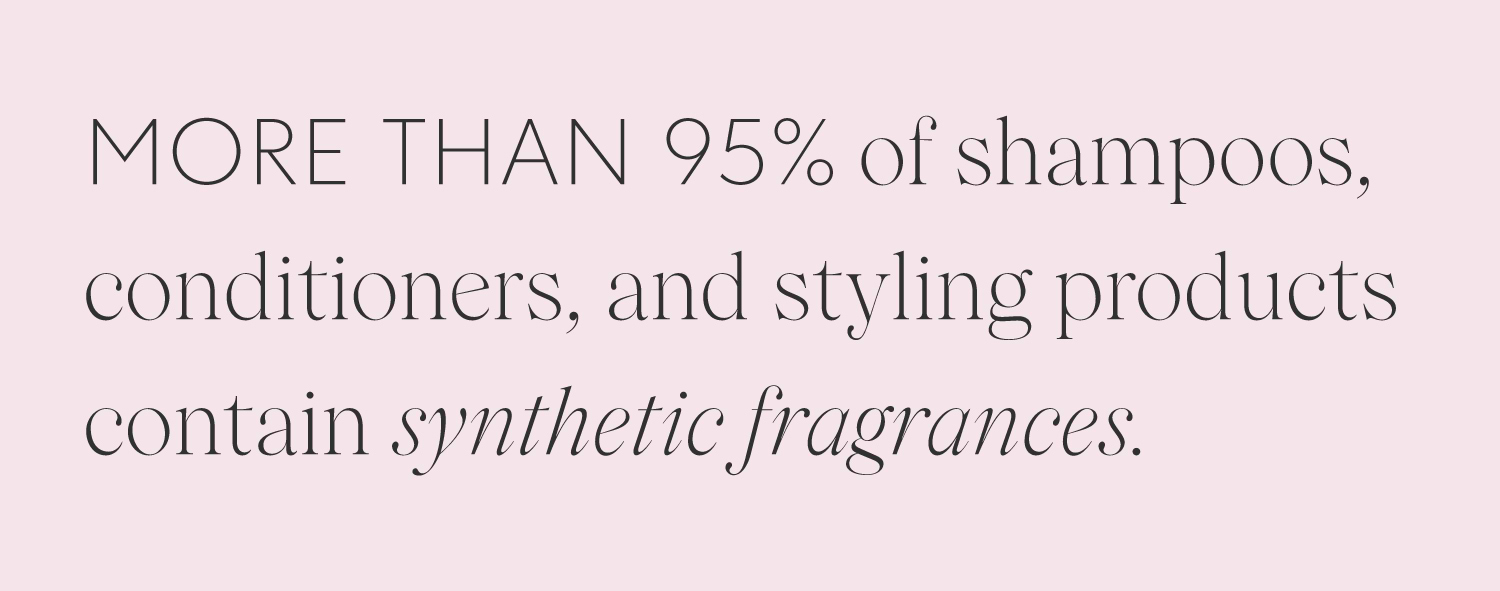
Synthetic fragrances are found in up to 95% of natural care products like shampoos, conditioners, deodorants and cosmetics. They can be used to add a specific scent to a product or to cover up a bad smell (do you remember what lipstick used to smell like?!). Manufacturers use a combination of scents so that they can claim their products are “unscented” which is another reason we need to be educated on what to look for. In fact, signature scents can contain hundreds of different chemicals, which is more than is found in a cigarette!
Synthetic fragrances are often made with petroleum-based ingredients (more on those below), such as phthalates, acetone, phenol, toluene, benzyl acetate, and limonene. Many companies use synthetic fragrances because they are cheaper, easier to produce than essential oils and the scent lasts a long time.
Some of the health effects of synthetic fragrances include:
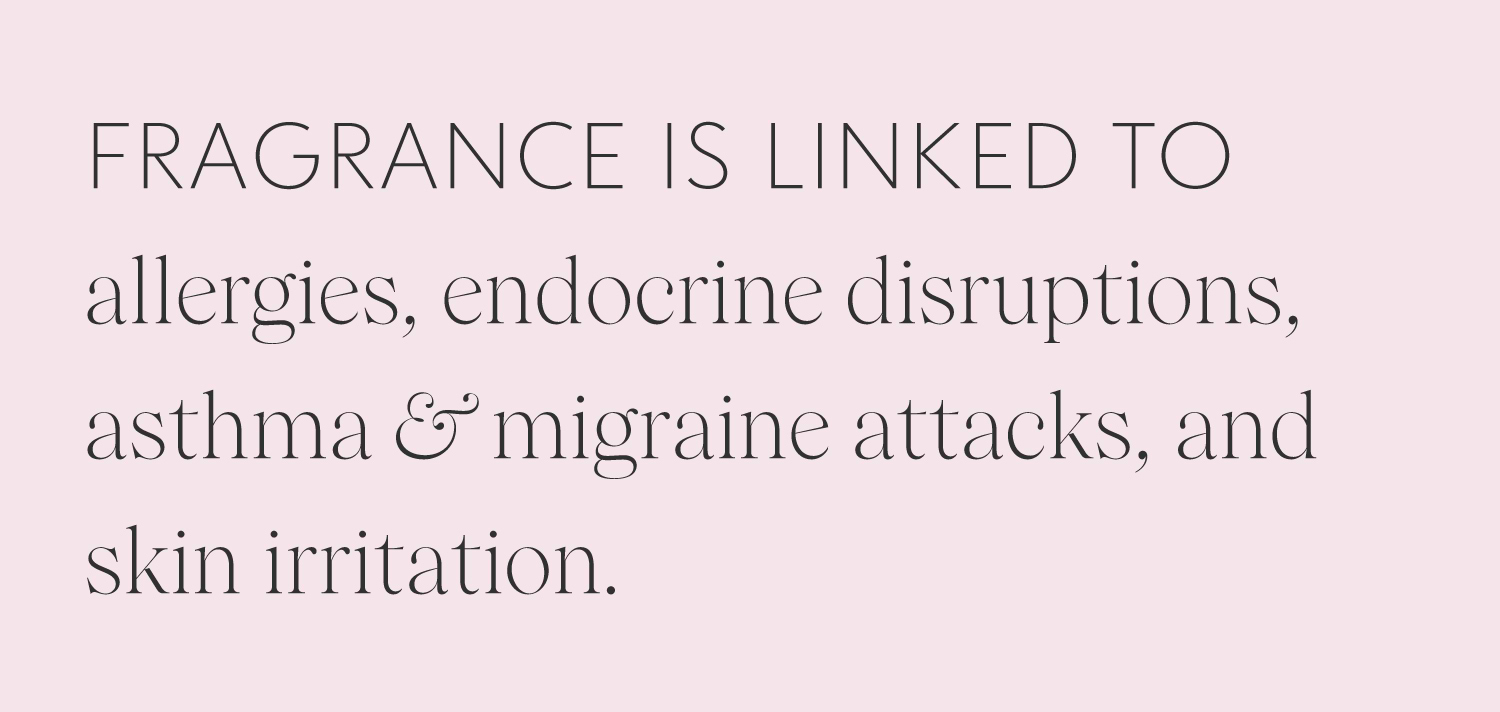
Read your labels and avoid these chemicals for joyous health! To learn more read this in-depth post on Everything You Need to Know About Synthetic Fragrances.
2. Formaldehyde-Releasing Preservatives
Formaldehyde-releasing preservatives are used as, you guessed it, preservatives in many beauty and personal care products from hair care to nail polishes, but that doesn’t mean they’re safe or good for your glow. While most cosmetic and beauty products no longer contain pure formaldehyde because it’s well-known contact allergen, many preservatives used in the beauty industry slowly release formaldehyde when in the presence of water such as in liquid foundations, anti-wrinkle creams, and shampoos. In fact, according to the EWG about 20% of beauty and cosmetic products contain formaldehyde-releasing preservatives - this is a lot!
Fact: Did you know we don't add water to any joyous health skincare product? Only pure plant botanicals!
Formaldehyde-releasing preservatives are one of the most common allergens for children with contact dermatitis and they are often found in baby soaps and wipes. They can cause:
When it comes to other health effects, formaldehyde and FRPs:
It’s also been noted that formaldehyde allergy can develop from repeated low-level exposure, such as what you would get by using products that contain these chemicals daily.
To learn what to look for on labels, read this post on Everything You Need to Know About Formaldehyde-Releasing Preservatives
3. BHT and BHA
BHT and BHA are synthetic antioxidants that you’ll often find in skincare and personal care products that contain fats and oils since they prevent them from going rancid. They are found in food too, but have been banned from children’s cereal products in Canada, not in the US though. These products can include:
To avoid BHA and BHT in your lip care products try making my DIY Lip Balm.
You’ll want to avoid products that contain these ingredients since they may cause hormone disruption and allergic reactions. The International Agency for Research on Cancer classifies BHA as a possible human carcinogen because some studies have found that they may be carcinogenic and can negatively impact the health of the liver, thyroid, kidneys, and lungs. While Health Canada has labeled BHA a “high human health priority”.
For more information on these ingredients check out this article: Everything You Need to Know About BHT and BHA
4. Petroleum-Based Ingredients
Petroleum-based ingredients are refined from crude oil to make the common ingredient, petrolatum (think Vaseline!) and they have been recommended for use as moisturizers and skin protectors since the 19th century. They are commonly used in beauty products ranging from anti-aging creams to moisturizers to shampoos, conditioners, lip balms, and makeup. You’ll even find them in supposedly high end brands.
Unfortunately, these ingredients create an occlusive barrier on the skin which prevents it from breathing and can trap impurities. Some people find that using products with petroleum-based ingredients can lead to breakouts and acne.
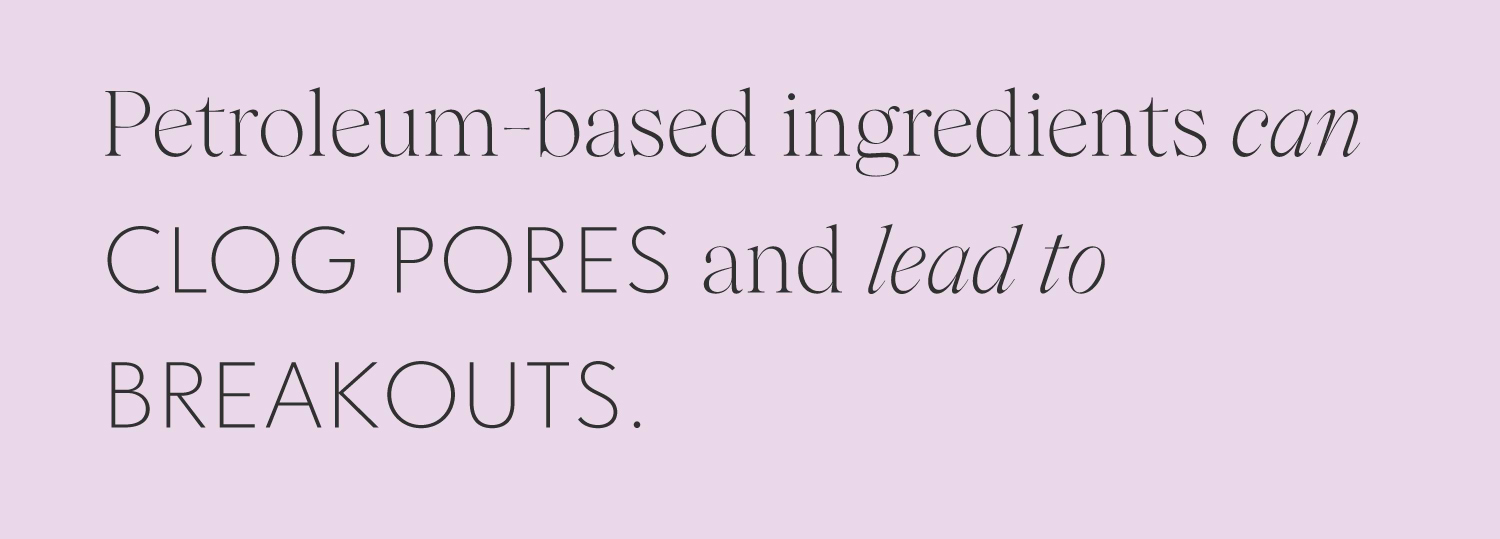
When it comes to negative health effects, petroleum-based ingredients can be contaminated with polycyclic aromatic hydrocarbons (PAHs). Researchers have found a correlation between exposure to these substances, including skin contact, and various types of cancers, such as lung, skin, and bladder. Other common health effects can include:
To support your healthiest skin and prevent breakouts and other health effects, avoid products containing the following:
For the complete list of petroleum-based ingredients to avoid, read more here: Everything You Need to Know About Petroleum-Based Ingredients
5. Parabens
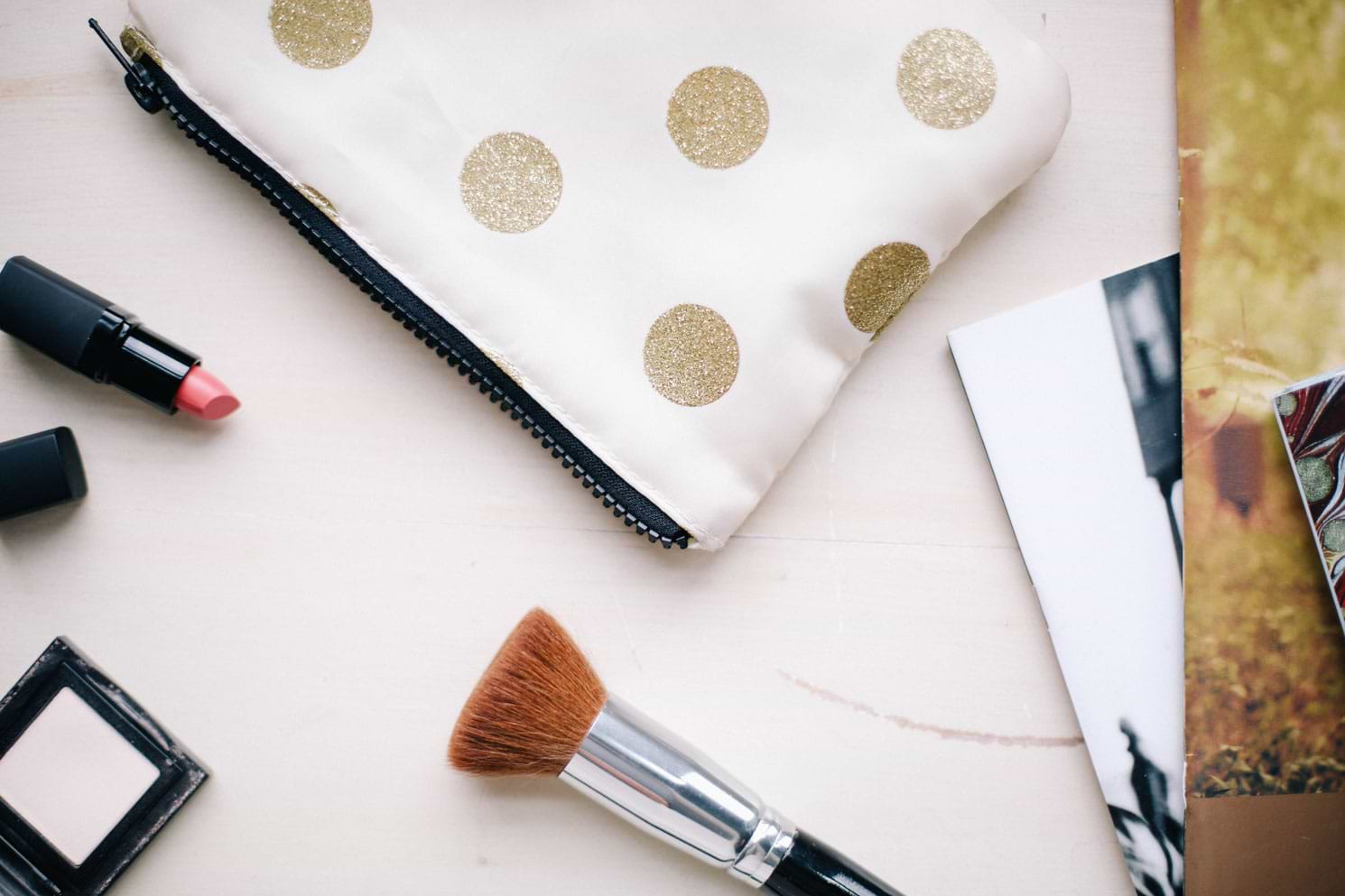
One of the most common ingredients found in cosmetic and beauty products are parabens. You may remember that they’re derived from petroleum-based ingredients, and are widely used as preservatives to extend the shelf life of cosmetics. They’ve been around since the 1920s and can be found in:
Unfortunately for us, parabens can mimic an important hormone, estrogen, which can lead to hormonal imbalances in everyone. This endocrine disruption can cause adverse neurological, reproductive, developmental, and immunological effects. Not only do parabens have a negative effect on the endocrine system, they can also cause allergic reactions in the skin leading to hives, itching, flakiness, dryness, and irritation.
Parabens can cause allergic reactions in the skin leading to hives, itching, flakiness, dryness, & irritation.
These chemicals are easily absorbed through your skin and accumulate over time the more you use products that contain them. To lower your exposure avoid products that contain:
It’s important to note that “paraben-free” is often used as a green-washing term. What defines it as greenwashing is the fact that a product is marketed as “paraben-free” only to be loaded up with another harmful ingredient, formaldehyde-releasing preservatives. Sneaky right?
6. Propylene Glycol
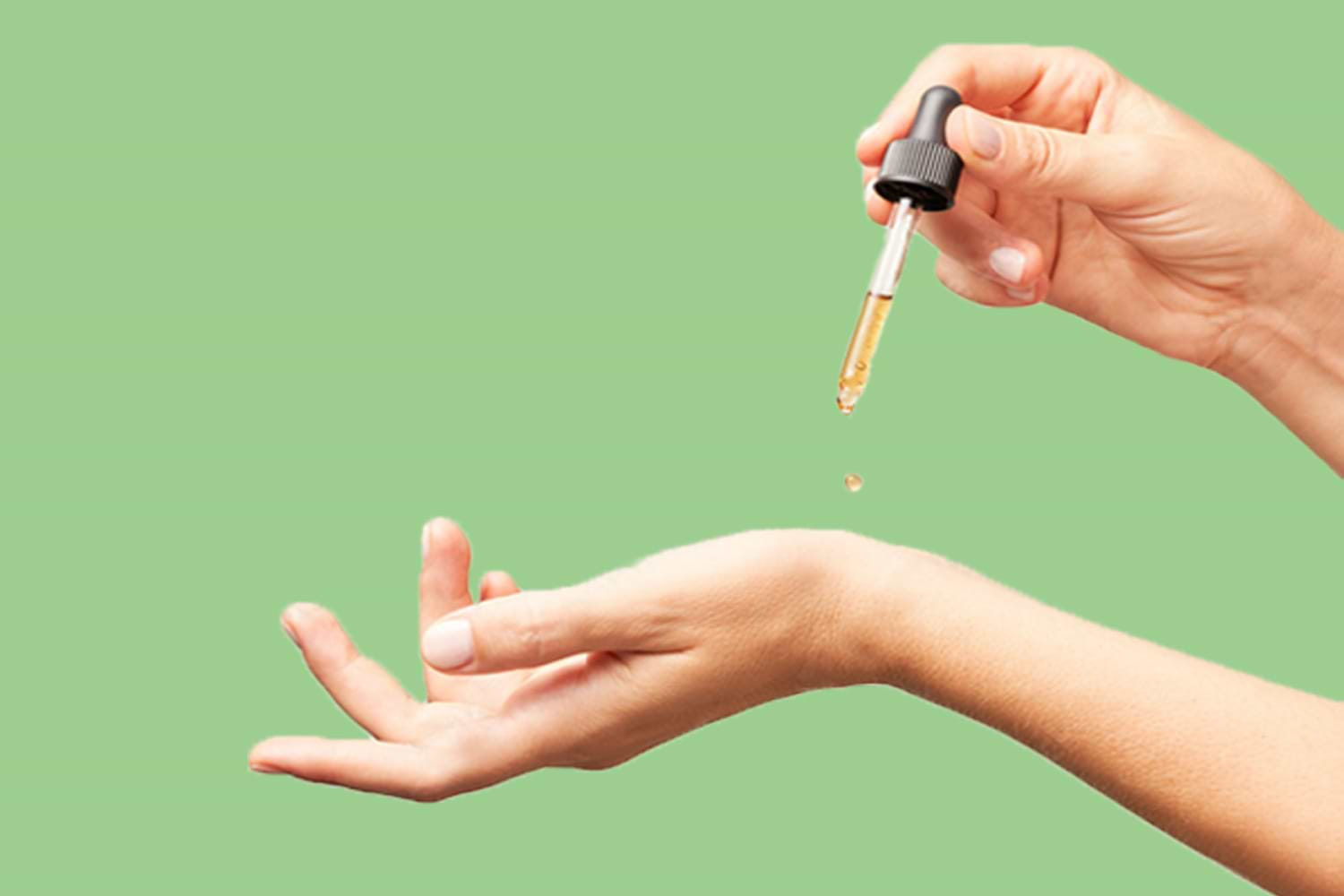
Propylene glycol (PG) is a synthetic product derived from petroleum-based ingredients. Typically it is added to control the viscosity of beauty and cosmetic products. It’s used as a humectant, which means it helps the skin attract water and to help other ingredients penetrate the skin.
You’ll often find propylene glycol in products that are designed to moisturize the skin and hair including shampoos, conditioners, moisturizers, body lotions, face masks, serums, and cosmetics.
The EWG has found that even with exposure to concentrations as low as 2%, PG is associated with:
If you have inflammatory or irritating skin conditions such as eczema, psoriasis, rosacea, sensitive skin, or allergies, it’s best you avoid propylene glycol for healthy, happy skin!
One great non-toxic alternative is propanediol, which is derived from corn-sugar and Eco-cert approved and what we use in our all-natural deodorants to keep your pits stink-free. You can also replace propylene glycol with plant-based humectants such as glycerin, which is what we use in our Fresh Face Cleanser and Lavender Shampoo.
Get all the details about PG in this in-depth article: Everything You Need to Know About Propylene Glycol
7. Sodium Lauryl Sulfate
Sodium lauryl sulfate (SLS) is commonly used as a surfactant in shampoos and body washes to help with foaming and cleansing. You can find it in other products including:
As you can see this ingredient is found throughout many beauty, household, and skincare products, which means that through repeated use it can continually strip the natural oils from your skin and scalp. Over time, this can cause skin irritation and dryness and even allergic reactions such as dermatitis due to its negative effect on the skin barrier and skin microbiome.
Repeated exposure, especially when combined with warm water, can cause skin irritation and using products with SLS is not recommended for anyone with inflammatory skin conditions such as eczema, rosacea, and psoriasis. If you struggle with a dry, itchy scalp then you’ll want to switch over to an all-natural shampoo and conditioner that do not contain SLS.
Often called the “everywhere chemical” phthalates are found throughout the environment and in many common beauty and skincare products. This class of manmade chemicals are used across many industries as solvents, binding agents, plasticizers, and in synthetic fragrances since they are super versatile in addition to being colourless and odourless. Unfortunately for us, phthalates never degrade, which means they can be found in everything from rainwater to soil, often contaminating our food chain!
The negative health effects of phthalates include:
Phthalates are considered an "everywhere chemical" & are found throughout the environment, where they unfortunately never break down.
You will typically find these chemicals in personal care products such as:
The type of phthalate most often found in synthetic fragrances, cosmetics, beauty and personal care products is called Diethyl phthalate (DEP).
For a full list of names to look out for and all the other details on this everywhere chemical, check out my post on Everything You Need to Know About Phthalates.
All-Natural Beauty Products
If you’re looking for products that are safe for you and the planet then Shop Joyous has you covered! Every product is formulated using safe, effective, high quality, organic ingredients, with a focus on functional plant-powered botanicals. But what’s included is just as important as what we leave out, that’s why all of our products are free from everything listed above in addition to all harsh chemicals, toxins, harsh detergents, synthetic fragrance, dyes, petroleum-based ingredients, GMOs or any hormone disrupting ingredients.
To make it easy for you to clean your entire beauty routine, we’ve pulled together the perfect bundle of our best-selling essentials: The Ultimate Joyous Beauty Bundle! Ditch the chemicals and treat yourself to functional, plant-based and organic products.
Nourish your scalp and moisturize your hair with all-natural rosemary and lavender infused hair care designed for great hair days. Upgrade your skincare routine with products designed to balance, tone, and hydrate your skin, naturally. Finally, don’t let dry skin get you down! Our Body Butter contains luxurious ingredients designed to leave your skin feeling smooth and supple.
This bundle includes:
I hope that this article has empowered you with knowledge about how these chemical ingredients are used in many conventional beauty products and why you want to limit your exposure to them, especially when using multiple products that contain a variety of chemicals. Understanding options for healthier alternatives allows you to use this knowledge to create a clean beauty routine that works for your skin.
You can feel confident exploring Shop Joyous Health for all-natural, plant-powered skincare, hair care, and body care products! We make a promise not to use any of these potentially harmful ingredients to protect you and the planet.
Xo Joy